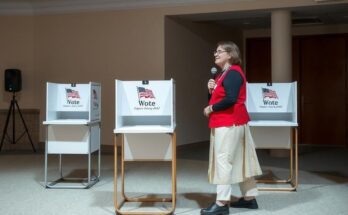Colorado is set to vote on a significant electoral reform proposal aiming to replace traditional partisan primaries with a nonpartisan top-four primary system, accompanied by ranked-choice voting. While proponents advocate for increased voter participation and competition, critics express concerns over chaos and potential undue influence from wealthy donors. This debate mirrors wider electoral changes considered across several other states, as stakeholders grapple with voter dissatisfaction.
The 2024 election debate in Colorado, although not overtly highlighted, is gaining substantial significance as it proposes a transformative shift in the state’s electoral processes. The state’s voters will be presented with a landmark proposal to replace traditional partisan primaries with a nonpartisan top-four primary system, accompanied by an instant ranked-choice runoff general election. This initiative has garnered strong backing from prominent business interests, yet it has faced staunch opposition from the established state parties and certain lawmakers. Significantly, Colorado joins six other states, including Nevada and Arizona, in contemplating fundamental reforms aimed at addressing widespread dissatisfaction with the electoral system among voters and donors alike. As a reflection of diverse regional political climates, states are exploring various options—from implementing top-two systems to adopting ranked-choice voting—differing in their approaches based on local sentiment. In Colorado, proponents argue that the proposed changes would enhance voter engagement and inspire more qualified candidates to enter the political landscape. However, critics warn that such a dramatic overhaul may lead to increased chaos within the electoral framework and allow wealthy donors to exert undue influence in a less regulated environment. This debate has ignited discord among elected officials, with members from both sides of the aisle expressing divergent views on the implications of these reforms. Democratic Senator Michael Bennet has voiced concerns about the lack of public support for the proposed changes, asserting, “In the time that I’ve represented Colorado, I’ve never had a single person, not one person, come up to me and say this is the way we should change our system.” Conversely, Senator John Hickenlooper offers a more optimistic perspective, labeling the proposal a potential “win-win” for citizen participation in democracy. Former Congressman Ken Buck, although historically aligned with the Republican party, echoes sentiments of frustration regarding the current political climate, advocating for reforms that would facilitate a more competitive political environment in Colorado. Currently, Alaska operates under a similar nonpartisan system, and the outcomes there have yielded mixed results, indicating that any predictions regarding the impact of Colorado’s potential reforms remain tentative. The ramifications of these changes could be observed in subsequent competitive elections, possibly altering the political landscape as early as the 2026 or 2028 elections. In conclusion, the ongoing dialogue surrounding the electoral reforms in Colorado underscores a critical juncture in the state’s political trajectory. As various stakeholders weigh the merits and demerits of a nonpartisan primary system, the outcomes could significantly reshape not only Colorado’s electoral dynamics but also serve as a barometer for similar movements in other states. The fundamental questions posed by these reforms—regarding voter participation, party influence, and election integrity—remain at the forefront of this pivotal discussion.
The discussion around the 2024 election in Colorado is significant due to proposed changes to the electoral process. The current initiative seeks to replace traditional partisan primaries with a nonpartisan top-four primary, requiring a thorough understanding of both the local political climate and the reform’s wider implications on voter engagement and party dynamics. This issue reflects a growing trend among several states addressing voter dissatisfaction, making the outcome of such a referendum crucial not only for Colorado but for other states considering similar changes. By looking at states currently employing nonpartisan systems, like Alaska, and analyzing their outcomes, a clearer picture can emerge regarding the potential efficacy and challenges of these proposed reforms in Colorado.
The proposed electoral reforms in Colorado, specifically the shift towards a nonpartisan top-four primary system, signify a critical moment in the state’s political landscape. As stakeholders engage in this contentious debate, the potential impacts on voter engagement, party influence, and electoral integrity are paramount. Ultimately, the outcomes of these discussions may set a precedent for other states grappling with similar issues, thereby influencing the broader electoral framework across the nation.
Original Source: www.semafor.com




